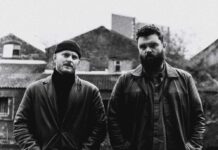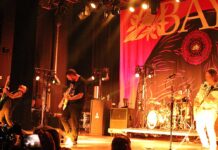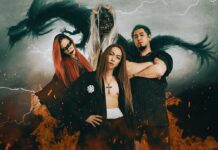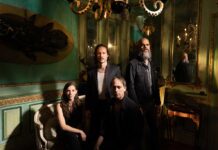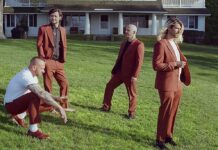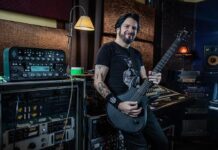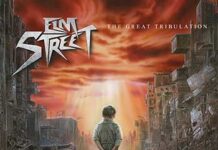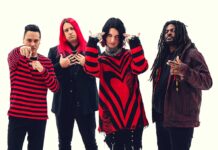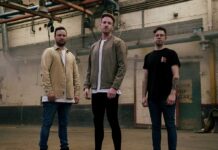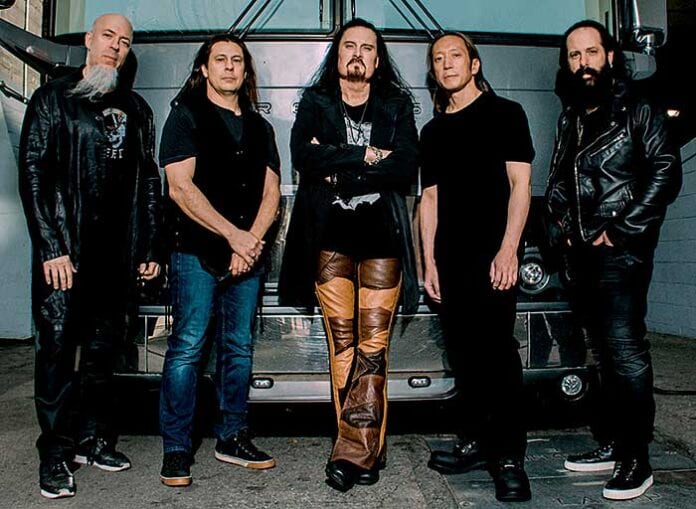
Photograph by Mark Maryanovich
INTERVIEW WITH JOHN PETRUCCI BY KELLEY SIMMS
PHOTOGRAPHS BY MARK MARYANOVICH AND NIDHAL MARZOUK
Progressive metal maestros, Dream Theater, have been on top of their game since its 1985 formation. Featuring vocalist James LaBrie, guitarist John Petrucci, bassist John Myung, keyboardist Jordan Rudess, and drummer Mike Mangini, Dream Theater has been thrilling audiences for 35 years. To celebrate the band’s 20th anniversary of their 1999 seminal concept album, Metropolis Part 2 – Scenes from a Memory, the band has released Distant Memories – Live in London. Mr.Petrucci recently spoke with us about the band’s early days, the new live album, beard care, and more.
The first time I saw Dream Theater was in late 1992 at a small club in Connecticut on the Images and Words tour. After the show, you loaded your own gear, got into your own cars, and headed back home to Long Island that night after the show. What were the early club days like, and did it play a big part in shaping the band into what it is today?
I definitely remember that well. In the very early years after we put out Images and Words, we decided to tour for it. We had a little bit of tour support money from the label and we had a new booking agent that we signed with. But nobody knew what we were capable of as far as a draw or anything, so they just booked clubs throughout the US. We rented a van and drove ourselves to all of these clubs, a lot of times literally driving overnight, not getting any sleep, setting up our gear, napping on the road cases, doing the gig.
“WE DEFINITELY PAID OUR DUES IN THOSE EARLY DAYS, AND IT WAS GOOD MEDICINE. IT SHOWED US THAT YOU NEED TO PUT HARD WORK IN”
If it was close enough like Connecticut, we’d get into our own cars and go home. We definitely paid our dues in those early days, and it was good medicine. It showed us that you need to put hard work in and also to appreciate the milestones, as small as they were in the beginning, such as being able to say we can’t drive ourselves, hiring a tour manager and that guy to drive us, and then eventually moving on to a tour bus, once we got some radio success. Things like that made us really savor and appreciate those milestones because of the hard work we put in. I remember those days really well.
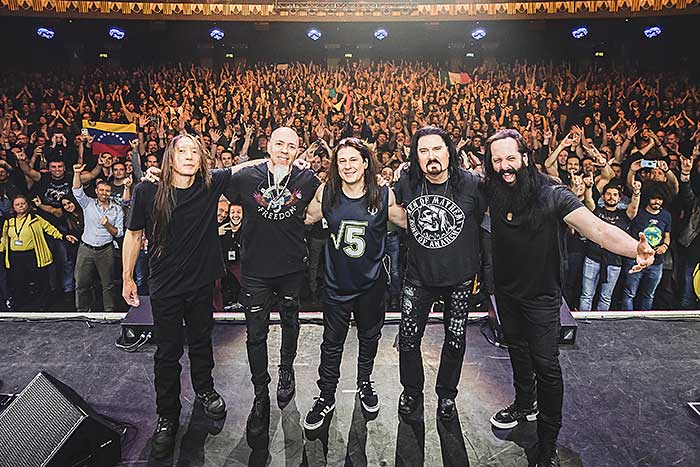
With the new live CD/DVD Distant Memories — Live in London, why London and this historic theater?
It’s definitely a historic theater. Dream Theater has played there a bunch of times in the past, and it’s such an iconic and beautiful theater. London is a city that we started to go to once we started touring internationally. We went to London on one of the first tours we did. So, it’s a market that we developed. And because of that, we developed a very strong fan base in London.
It’s funny with live filming trying to decide where to do it, because there’s so many countries that we’ve played. As an international band, there are so many amazing settings, outdoors/indoors, different venues. We’ve done Radio City Music Hall, we’ve done Budokon. It’s nice to record in a place that has that history. And the other part of it is also looking at the way we wanted to do it, knowing that we wanted to film two nights. London was the only stop on that tour where we had two nights. And it was toward the end of the tour, which was important to us because we didn’t want the filming to be for the first two shows or anything like that. All those factors played a role.
“WE WANTED THIS TO BE MORE OF A CONCERT FILM GIVING YOU THE VIBE THAT YOU WERE THERE.”
For the DVD portion of the show, it’s credited as a film by Pierre and Francois Lamoureux, with you as the producer. What do you think of the final cut and what were you going for with the overall effect?
The great thing about working with professionals who you trust is that you can pretty much hand it over and trust that they’re going to do an incredible job—that’s why you’ve hired them. First with Pierre when we did Breaking the Fourth Wall [2014], we shot that at another iconic theater in Boston—the Boston Opera House. And he and his brother Francois did a great professional job. None of us in the band had to or needed to get involved in the editing at all because they’re just so good at what they do. And that’s a big reason why you continue to work with somebody and choose them to do a project. I put my faith in them.
We talked about what the two nights would look like and the vibe that we were going for, what we wanted to do, and what we didn’t want to do. And what we wanted to do differently from the last time, stuff like that, were more in the producer’s role, not getting into the nitty-gritty of editing per se. Of course, when they send cuts for approval, the band and I will have a say, but they’re really adept at doing that. We purposely didn’t do any split screens like we did on Breaking the Fourth Wall. We wanted this to be more of a concert film giving you the vibe that you were there. Also, because it was special—the venue, the stage set, the special painted backdrops, the custom screen, and the animations that we did—we wanted it to look like you were really there and taking all of that in, and doing quick cuts and split screens and things like that was not the way to do it.
Distant Memories – Live in London is the band’s ninth live release, which is a big output of live albums. Did you want to focus on later era material to go along with the 20th anniversary of Metropolis Part 2 – Scenes from a Memory?
The live performances, and this is what has made the pandemic and Covid so frustrating for us and for so many bands all around the world, but performing live is such a big part of our career path. It has been from the beginning, as you mentioned from the beginning of this interview, us in a van. We started that way. We’re not just a studio band. We put out records and then we tour extensively internationally. There’s a lot of countries in the world, but there’s not too many left that we haven’t hit.
The capturing of the live show, time capsuling that in the form of a live album or a DVD and being able to package it in a way that really commemorates that tour with not only the film footage and the audio, but the beautiful photos, the credits, all the people who were involved—something that you can hold in your hands and if you were there, to savor the memories of that night, or if you weren’t there, that you’re able to experience it in the most immersive way possible—it’s always been important for us. It’s not an afterthought, it’s not secondary. It’s a part of what we do.
“WE PUT OUT RECORDS AND THEN WE TOUR EXTENSIVELY INTERNATIONALLY. THERE’S A LOT OF COUNTRIES IN THE WORLD, BUT THERE’S NOT TOO MANY LEFT THAT WE HAVEN’T HIT.”
In addition to the new Dream Theater live record, you recently put out your second solo album, Terminal Velocity. Former Dream Theater drummer Mike Portnoy played on all the tracks, which was the first time working together in a decade. What was that experience like?
Asking Mike Portnoy to play on the album was something that I was considering, and it was a decision that I thought about because we hadn’t played together since he left Dream Theater 10 years ago. We’re friends, but we haven’t done anything musically together, and I thought he’d be amazing for this album. I’m so happy he said yes because he did a phenomenal job. He came up to my studio and we spent a week. I had already written the album and recorded the guitar, so he played drums to the guitars. We were able to play and jam out some of the more difficult parts. We didn’t really get to record the album together, per se. But just having him in the studio for a solid week, hanging out, having fun, listening to him play on my music, and hearing that sort of sound again was really refreshing. There was something nostalgic about it. I’m really happy that the fans reacted in such a positive way and didn’t turn it into anything controversial or dramatic, which it didn’t need to be. Because of Dave LaRue and because of Mike, I think my solo album is a lot better than I could have imagined.
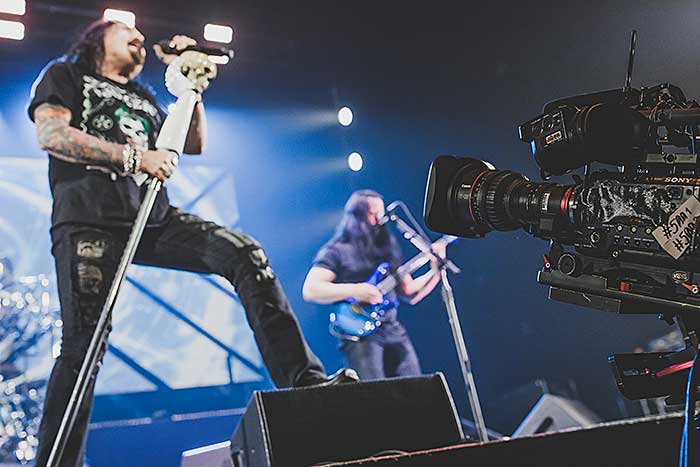
Dream Theater is currently working on a new studio album, and you’ve built your own headquarters including a studio. Due to this ongoing pandemic and social distancing, how will the band complete the recording?
We started working on it a few weeks ago. We’re super excited about the direction of the music we’ve written so far. This headquarters that we built before Covid started, the timing could not have been better. It’s been such a great facility—I did my solo album and so many other projects and things that we’ve gotten done. We’re all here very comfortable. We keep our circle really small and we’re very safe. The only person who isn’t able to be here joining us in person is James. He’s up in Canada and there are some restrictions with quarantine, but we do have him as a part of the sessions tied into the audio on Zoom, and he’s right there and he’s watching and we’re watching him and we’re communicating. We’re working with that part as best as possible. The band’s all together, we’re having a great time. Again, we’re all super happy with the direction of the music already, even in these early stages.
“WE STARTED WORKING ON IT A FEW WEEKS AGO. WE’RE SUPER EXCITED ABOUT THE DIRECTION OF THE MUSIC WE’VE WRITTEN SO FAR.”
On a personal note, you have a new beard grooming product line. How did this come about?
Thanks for bringing that up. I got into the whole bearding culture a while ago. It’s funny, as a man you grow a beard, you shave it off, and you do this and that. I experimented with different beard styles for a long time. You can go back and look up pictures of me and you’ll see all different types of beards. At one point I decided to do a real full beard, and in doing that I just went down the rabbit hole of there’s a whole culture of beard products, grooming and oils and balms, and how-to videos and everything. I just became really into it, almost as a hobby. It morphed into what’s now known as my look, I guess, for the past several years.
Just in the same way as my musical equipment endorsements, the thing with Captain Fawcett, who’s the company that makes the beard oil, all happened very organically. I was a customer, I used their stuff. I received it as a gift from my wife and I started buying more things. At some point several years later they reached out, because somebody was a Dream Theater fan. I met that person at the London DVD shows, that’s how new this is. They’ve been very kind. They do a celebrity endorsed signature beard products with UK models and barbers. But I asked if they ever done this with a musician, there’s so many musicians who have beards, it’s such a community. We started a conversation and the next thing you know, we had a partnership. So, John Petrucci’s Nebula beard oil was born. It’s an awesome product, just like everything else they do. They’re great at packaging and marketing. The quality of what they do, if you go to their site, is amazing. The scent is awesome, it’s just great! It was like this organic progression of something I never thought I would get into, but it happened in a way that really made sense. I’m glad that it’s out and we can share that with all of you bearded gentlemen out there!
Since no one knows when bands can get back to full tours, besides writing the new Dream Theater album, what will you focus on next going forward?
This will be the focus, really. Because we’re at the beginning stages of this. This will take us awhile to write and complete and produce. I don’t believe it will come out until a ways into 2021, but this will definitely keep us consumed. And then we’ll see where we’re at. Everybody’s trying to pivot and adjust in this industry. We’re hearing all different versions of when live touring will be a reality and even when it does what that will look like. There’s obviously going to be a renaissance of new music, a major influx of bands needing to get out there and tour. I wonder what that congestion will look like. I’m not sure. Like you said, it’s unknown.
“WE’RE CREATIVE PEOPLE AND WE LOVE WRITING MUSIC, AND THAT’S WHAT WE’RE DOING.”
Obviously, a vaccine will really influence the world in a positive way and turn things around in all industries. The live touring music industry has not been given the opportunity to adjust to what’s been going on. You have sporting events going on with empty venues, or social distanced venues. You have gyms opened and restaurants and so on, but touring live concert events have just been stopped. It’s taken a real toll on the industry. It’s very hard for people to survive this type of thing, if you think about being off for two years maybe, when this is all said and done. We’re focusing on as much positive stuff as we can, as depressing as what I just said was. We’re focusing on what we do. We’re creative people and we love writing music, and that’s what we’re doing. So, that will be the focus for the next several months and we’ll see where we’re at. Hopefully, things will turn around.


